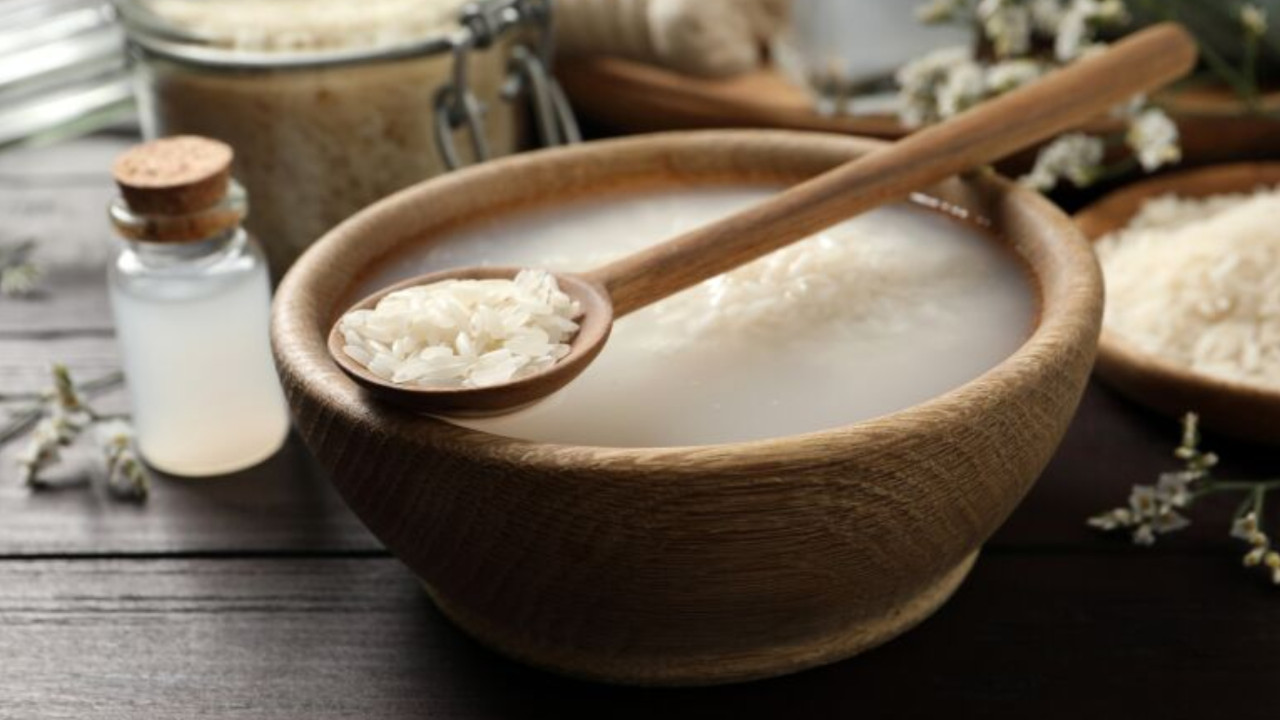Rice Water (Tandulodaka): Ayurvedic Preparation and Benefits
Rice water, known as Tandulodaka in Ayurveda, has been used for centuries as a natural remedy to promote health and wellness. This simple yet powerful concoction is rich in nutrients, including vitamins, minerals, and antioxidants, making it a versatile ingredient for various applications.
Beyond traditional medicine, rice water has gained popularity in modern skincare routines and health drinks, thanks to its ability to hydrate, soothe, and nourish the skin. In Ayurvedic practice, rice water is celebrated for its digestive benefits, helping to alleviate gastrointestinal issues and promote overall gut health.
Additionally, it is believed to enhance immunity and provide energy, making it an excellent addition to daily wellness routines. In this article, we’ll dive deep into the Ayurvedic preparation methods, explore its myriad uses—from skincare to dietary applications—and highlight the numerous benefits of rice water.
Discover how this humble ingredient can transform your health and beauty regimen, offering a natural solution to common wellness concerns.
What is Rice Water (Tandulodaka)?
Rice water refers to the starchy liquid that remains after soaking or boiling rice. This water contains essential nutrients, such as vitamins, minerals, and amino acids, which make it an excellent health tonic.
According to Ayurveda, rice water serves as a cooling agent and helps maintain bodily balance, especially during hot seasons.
The Significance of Rice Water in Ayurveda
In Ayurveda, rice water holds a unique place for its ability to nourish the body, cool down the system, and aid digestion. This versatile preparation is categorized as “laghu” (light) and “sheetal” (cooling), making it particularly beneficial for balancing Pitta dosha.
Rice water’s cooling properties help alleviate excess heat in the body, which can manifest as inflammation, acidity, or skin irritations. Due to its gentle and soothing nature, rice water is often recommended as a remedy for various digestive issues, such as diarrhea and indigestion.
It acts as a natural hydrator, helping to replenish lost fluids and electrolytes, making it an excellent choice for combating dehydration, especially in hot climates or during illness. Furthermore, rice water has remarkable benefits for the skin.
Its nourishing and hydrating qualities can soothe irritations, reduce redness, and promote a healthy complexion. Many Ayurvedic practitioners suggest using rice water as a facial rinse or in skin care formulations to harness its revitalizing effects.
Rice water is a cherished element in Ayurvedic practice, recognized for its holistic benefits and its role in promoting overall health and wellness.
Key Nutrients Present in Rice Water
Rice water is rich in:
- Amino acids – Essential for tissue repair and growth
- Vitamins B1 and B2 – Boost energy and improve skin health
- Minerals like magnesium – Support muscle relaxation and heart health
- Antioxidants – Combat free radicals, promoting healthier skin and hair.
Types of Rice for Preparing Rice Water
When it comes to selecting rice for your rice water, most varieties will work well, but some options are particularly beneficial. Here are some recommendations:
- Any Rice: You can use any type of rice, including broken rice, which is often more accessible and economical.
- Red Rice: This variety is particularly beneficial due to its higher nutrient content, including antioxidants, which can enhance the health benefits of the water.
- Aged Rice: One-year-old rice is considered very good for preparation, as it often has a richer flavor and greater nutrient density.
- White Rice: While not the first choice, white rice is also acceptable and widely available.
Preparation Tips:
- Raw Rice: Ensure the rice is uncooked (raw), preferably unpolished, and de-husked. Unpolished rice retains more nutrients, making it a healthier option. Avoid steamed rice, as it may lack the natural starches and nutrients you want to extract.
Water:
- Use potable water—cold or boiled and cooled water works well. The quality of water can influence the overall benefits of the rice water, so choose clean, filtered water whenever possible.
Vessel:
- A mud vessel is the best choice for preparing rice water, as it enhances the natural properties of the mixture. The porous nature of clay helps to improve the mineral content of the water, making it even more beneficial for consumption and skincare.
Additional Tips:
- Rinse the rice thoroughly before use to remove any impurities and dust.
- Experiment with different types of rice to find the flavor and benefits that suit you best.
- Consider using leftover rice from meals, ensuring it’s uncooked and unseasoned, to minimize waste and maximize benefits.
By selecting the right type of rice and following these preparation tips, you can create a nutritious and refreshing rice water that supports your health and wellness.
Types of Rice Water Preparation
1. Fermented Rice Water
Fermented rice water is created by soaking rice in water and allowing it to ferment for 24 hours. This process not only enhances its nutrient content but also introduces beneficial bacteria, which can promote gut health and improve digestion.
The fermentation adds a slightly tangy flavor and increases the levels of vitamins and amino acids, making it a potent health tonic. It can be used in various ways, including as a skin toner or a refreshing drink.
2. Boiled Rice Water
Boiled rice water is the starchy liquid that remains after cooking rice. This preparation is slightly thicker than fermented rice water and has a creamy texture, making it ideal for culinary applications.
It is often used as a base for soups, porridge, and health drinks, providing both flavor and nutritional benefits. The starch in boiled rice water can also help soothe digestive issues and provide energy, making it a comforting option for those recovering from illness or in need of hydration.
Both types of rice water offer unique benefits and can be easily incorporated into your daily routine, whether for health, cooking, or skincare purposes.
How to Prepare Rice Water (Tandulodaka) the Ayurvedic Way
Ayurvedic preparation of rice water focuses on maintaining its natural essence. Below are two common methods for preparing it at home.
Step-by-Step Method for Fermented Rice Water
- Take ½ cup of rice and rinse it thoroughly to remove dirt and impurities.
- Soak the rice in 2 cups of water for 12-24 hours.
- After soaking, stir the mixture gently, allowing the water to absorb nutrients.
- Strain the water into a clean container.
- Store the fermented rice water in the refrigerator for up to 3 days.
Step-by-Step Method for Boiled Rice Water
- Take ½ cup of rice and rinse it well.
- Boil 3 cups of water in a pan and add the rinsed rice.
- Cook the rice for 10-15 minutes until the water turns milky white.
- Strain the liquid and store it in a glass jar.
- Let it cool before drinking or using it on the skin.
Benefits of Rice Water in Ayurveda
Rice water boasts a multitude of uses in Ayurveda, making it a versatile ingredient for both internal consumption and external application. Here are some key benefits:
1. Digestive Health: Rice water is known for its soothing properties, making it effective for alleviating digestive issues such as diarrhea and indigestion. It helps replenish lost fluids and provides gentle nourishment to the gastrointestinal tract.
2. Hydration: As a natural source of hydration, rice water is beneficial for replenishing fluids in the body, especially during hot weather or after illness. It can be consumed as a refreshing drink to maintain hydration levels.
3. Skin Care: Rice water is widely used in Ayurvedic skincare routines. Its cooling and soothing properties help calm irritated skin, reduce redness, and provide a gentle cleanse. It can be applied topically as a toner or face rinse for a radiant complexion.
4. Hair Care: Rice water is celebrated for promoting healthy hair. It can strengthen hair strands, improve elasticity, and add shine. Using it as a rinse after shampooing can help nourish the scalp and reduce frizz.
5. Nutritional Supplement: When consumed, rice water acts as a nourishing drink, rich in carbohydrates, vitamins, and minerals. It is often recommended for convalescents and those needing a gentle energy boost.
6. Detoxification: Rice water can aid in detoxifying the body by flushing out toxins and promoting healthy kidney function. Its mild diuretic properties help in maintaining fluid balance.
7. Cooling Agent: Due to its “sheetal” (cooling) nature, rice water is particularly beneficial for those with a Pitta dosha imbalance. It helps cool down excess heat in the body, making it ideal for hot weather or inflammatory conditions.
By incorporating rice water into your daily regimen, you can harness its numerous health and beauty benefits, reflecting the holistic principles of Ayurveda.
Benefits of Rice Water for Skin and Hair
Rice water is a cherished ingredient in both skincare and hair care routines, praised for its natural properties and effectiveness. Here are some of the key benefits:
For Skin:
1. Hydration: Rice water is an excellent natural moisturizer, helping to hydrate and soothe dry skin. Its lightweight texture allows for easy absorption, leaving the skin feeling refreshed.
2. Soothing Irritation: The cooling properties of rice water make it effective for calming irritated or inflamed skin. It can help reduce redness and discomfort associated with conditions like eczema and acne.
3. Brightening Effect: Regular use of rice water can help brighten the skin and improve overall complexion. It may help reduce dark spots and promote an even skin tone.
4. Anti-Aging Properties: Rich in antioxidants, rice water can help combat free radicals, thereby reducing the appearance of fine lines and wrinkles. Its nourishing properties promote skin elasticity and firmness.
5. Gentle Cleanser: Rice water can be used as a natural cleanser, removing impurities and excess oil without stripping the skin’s natural moisture. It’s suitable for all skin types, including sensitive skin.
6. Toner: As a natural toner, rice water helps tighten pores and prepare the skin for better absorption of serums and moisturizers. It leaves the skin feeling smooth and refreshed.
For Hair:
1. Strengthening Hair: Rice water is known to strengthen hair strands and reduce breakage. Its high protein content helps fortify the hair, making it less prone to damage.
2. Enhancing Shine: Using rice water as a hair rinse can add shine and luster to dull hair. It smooths the hair cuticles, resulting in a glossy finish.
3. Improving Hair Elasticity: The amino acids present in rice water improve hair elasticity, making it more flexible and less likely to break. This is especially beneficial for curly or textured hair.
4. Promoting Hair Growth: Regular use of rice water may promote hair growth by providing essential nutrients to the scalp and hair follicles. It helps nourish and strengthen roots, leading to healthier hair growth.
5. Reducing Frizz: Rice water helps tame frizz and flyaways, making hair more manageable. Its smoothing properties create a protective layer around the hair strands.
6. Scalp Health: The gentle, nourishing nature of rice water can help maintain a healthy scalp, reducing dryness and irritation. It may also promote a balanced scalp environment, beneficial for those with dandruff or sensitivity.
Incorporating rice water into your skincare and hair care routines can provide a natural and effective way to enhance your beauty regimen, leveraging the time-honored wisdom of Ayurveda.
Ayurvedic Medicinal Uses of Rice-Washed Water
Rice-washed water is highly regarded in Ayurveda as a co-drink (Anupana) that enhances the efficacy of various medicinal formulations.
By consuming it alongside specific Ayurvedic medicines, you can better appreciate the beneficial qualities of rice water. Here are some notable medicines and their uses:
1. Brihat Gangadhara Churna
This herbal formulation is commonly used for the treatment of diarrhea. When taken with rice water, it helps soothe the digestive system, replenishing lost fluids and nutrients.
The gentle properties of rice water assist in reducing inflammation and providing hydration, making it an effective remedy during gastrointestinal disturbances.
2. Praval Bhasma
Comprising the calx of coral, Praval Bhasma is utilized in treating dysuria, or difficulty in urination. When consumed with rice water, it enhances the absorption of the medicine, helping to relieve urinary discomfort.
The cooling nature of rice water complements Praval Bhasma, promoting kidney health and soothing the urinary tract.
3. Pushyanuga Churna
This formulation is often prescribed for conditions such as leucorrhea, menstrual disorders, and excessive menstrual bleeding. Rice water acts as a nourishing base that supports the action of Pushyanuga Churna, helping to balance hormonal fluctuations and alleviate symptoms associated with these conditions.
Its soothing properties may also assist in reducing discomfort during menstruation. By incorporating rice-washed water as a co-drink with these Ayurvedic medicines, you can enhance their therapeutic effects.
The nutrient-rich composition of rice water not only supports digestive health but also promotes overall well-being, making it a valuable addition to Ayurvedic practices.
Remedies with Rice Water
Rice water, or Tandulodaka, is utilized in various traditional remedies in Ayurveda due to its soothing and nourishing properties. Here are some notable applications:
1. Relief from Fly Bites
A fine paste made from Tulasi (holy basil) leaves ground with Tandulodaka can effectively pacify the toxic effects caused by bites from various flies.
This remedy helps soothe irritation and reduce inflammation associated with such bites, as noted in the Vaidya Sara Sangraha.
2. Diarrhea and Dysentery Treatment
For digestive issues such as diarrhea and dysentery, a mixture of sandalwood powder and honey combined with Tandulodaka is beneficial.
This remedy not only helps in alleviating symptoms but also provides cooling effects to the digestive tract, promoting healing.
3. Relieving Burning Sensation
To address burning sensations in the body, a paste made from any combination of the following ingredients—Amla (Indian gooseberry), aloe vera, ash gourd, Bhringaraja, cumin seeds, cotton leaves, Giloy, Jamun leaves, and Ivy gourd leaves—can be created by rubbing them with rice water.
After preparing the paste, equal amounts of butter and sandalwood paste are added and mixed thoroughly. Applying this fine paste all over the body can effectively soothe burning sensations, especially those caused by mercurial medicines, as described in the Basavarajeeyamm.
4. Paittika Atisara (Dysentery)
A remedy for dysentery associated with Pitta dosha involves the fruit and bark of Vatsaka (Holarrhena antidysenterica) combined with Ativisa (Aconitum heterophyllum) and honey.
Consuming this mixture along with Tandulodaka can help alleviate symptoms of Paittika atisara, providing relief from inflammation and digestive distress, as noted in Charaka Atisara Chikitsa.
5. Excessive Thirst and Dry Mouth
For those suffering from excessive thirst and dry mouth, a powder made from Murva (Marsedenia tenacissima) combined with Tandulodaka and honey serves as an effective treatment.
As mentioned in Charaka Chardi Chikitsa, this remedy helps hydrate and nourish the body, alleviating dryness and discomfort.
These remedies illustrate the versatility of rice water in Ayurvedic practice, showcasing its ability to support various health concerns naturally and effectively.
How Many Days Can Rice Water Be Stored?
Rice water should ideally be consumed fresh, as it retains the most nutrients and benefits when prepared and used within a short time frame. It can be stored for 6 to 8 hours at room temperature.
If you need to keep it longer, it’s best to refrigerate it, where it can last up to 24 hours. However, for optimal freshness and effectiveness, it’s recommended to prepare rice water in smaller batches that can be consumed within a day.
Dosage Recommendations
For internal consumption, a typical dose of rice water is up to 50 ml, taken once or twice per day. This dosage can help with hydration, digestive health, and overall wellness.
Adjust the dosage based on individual needs and responses, and consult with a healthcare practitioner if you have any specific health concerns.
By following these guidelines, you can ensure that you’re getting the most out of your rice water preparation.
Precautions and Contraindications
While rice water is generally considered safe and beneficial for most individuals, it’s important to keep the following precautions in mind:
1. Cold-Related Ailments: Fermented rice water may not be suitable for individuals suffering from cold-related ailments, as it can exacerbate symptoms like congestion or a runny nose. Those with a predominance of cold conditions (like excess mucus) should opt for fresh or boiled rice water instead.
2. Excess Consumption: Although rice water can be hydrating and soothing, excessive consumption may lead to bloating or discomfort in some individuals. It’s advisable to stick to the recommended dosage of up to 50 ml once or twice per day to avoid any digestive issues.
3. Freshness Matters: Always use freshly prepared rice water for the best results. Over time, rice water can lose its potency and beneficial properties. Stale or old rice water may not provide the same health benefits and could potentially harbor unwanted bacteria.
4. Allergies and Sensitivities: Individuals with specific allergies or sensitivities to rice or any additional ingredients used in rice water preparations should exercise caution. Always monitor for any adverse reactions when trying rice water for the first time.
5. Medical Conditions: Those with certain medical conditions, such as diabetes or kidney issues, should consult a healthcare professional before incorporating rice water into their diet, as it may affect blood sugar levels or fluid balance.
By keeping these precautions in mind, you can enjoy the benefits of rice water while minimizing any potential risks.
FAQs
Q1: What is rice water?
A1: Rice water is the starchy liquid obtained by soaking or boiling rice, rich in nutrients and used in culinary and medicinal applications.
Q2: How do I prepare rice water?
A2: Soak 10 grams of raw rice in 60-80 ml of water for 2-6 hours, then macerate and filter the mixture. Alternatively, boil rice and use the starchy water left behind.
Q3: What are the benefits of rice water for the skin?
A3: Rice water hydrates, soothes irritation, brightens complexion, and reduces fine lines. It’s often used as a natural cleanser or toner.
Q4: Can I use rice water for hair care?
A4: Yes! Rice water strengthens hair, enhances shine, improves elasticity, and reduces frizz. Use it as a rinse after shampooing.
Q5: How long can I store rice water?
A5: Best consumed fresh within 6-8 hours at room temperature or up to 24 hours when refrigerated.
Q6: Are there any contraindications for rice water?
A6: Fermented rice water may not suit those with cold-related ailments, and excessive consumption can lead to bloating. Always consult a healthcare professional if concerned.
Q7: Can children consume rice water?
A7: Yes, rice water is generally safe for children. Start with small amounts and consult a pediatrician for any concerns.
Q8: How does rice water aid digestion?
A8: Rice water soothes the digestive tract, replenishes fluids, and can help alleviate diarrhea and indigestion.
Q9: Can I use rice water for cooking?
A9: Absolutely! Rice water can be used as a base for soups and stews, adding nutritional value and flavor.
Q10: Is rice water suitable for all skin types?
A10: Yes, rice water is gentle and suitable for all skin types, including sensitive skin.
Rice water, or Tandulodaka, offers a simple yet powerful way to enhance health and beauty. Whether you drink it for digestive benefits or apply it to your skin and hair.


























